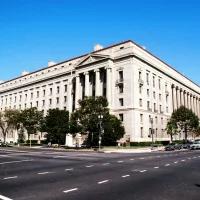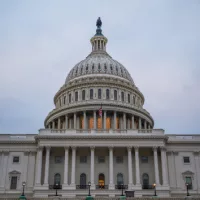
 Official White House Photo by Shealah Craighead(WASHINGTON) — After President Donald Trump said that Democrats would never be satisfied with what’s released from special counsel Robert Mueller’s report and one of his lawyers wrote to the Treasury Department to say the IRS should reject a committee chair’s request for Trump’s tax returns, two key House Democrats on the Judiciary and Ways and Means Committees pushed back Sunday.
Official White House Photo by Shealah Craighead(WASHINGTON) — After President Donald Trump said that Democrats would never be satisfied with what’s released from special counsel Robert Mueller’s report and one of his lawyers wrote to the Treasury Department to say the IRS should reject a committee chair’s request for Trump’s tax returns, two key House Democrats on the Judiciary and Ways and Means Committees pushed back Sunday.
On the issue of the Mueller report, Judiciary Committee member Rep. Pramila Jayapal, D-Wash., said Trump “should test” his theory that Democrats won’t be satisfied “by releasing the entire report and the underlying information.”
She added, however, that she doesn’t think Trump nor Attorney General William Barr will do that.
“I think that there is a real problem with a politically appointed attorney general who seems to have released a three-page report on the actual report — the only thing we’ve seen so far — that now is seeming to not comport with what Mueller and his team actually prepared,” Jayapal said on ABC News’ This Week. “I think the main thing here is what is the president hiding? How do we make sure that we get everything that was produced? We have not seen a Mueller report. We have only seen a Barr report, so we’re going to stay firm on this. We’re going to push hard.”
On Wednesday, the House Judiciary Committee voted along party lines to authorize Chairman Jerrold Nadler, D-N.Y., to issue subpoenas for Mueller’s full, unredacted report and the underlying evidence.
Barr is currently working with Mueller’s team to redact grand jury information, classified material and anything else from the nearly 400-page report that would compromise ongoing investigations and the privacy of “peripheral third parties,” he wrote in a letter to Capitol Hill on March 29.
On Capitol Hill Wednesday, Nadler questioned the Justice Department’s intentions in the redaction process.
“We have reason to suspect this administration’s motives. The Mueller report probably isn’t the ‘total exoneration’ the President claims it to be,” Nadler said. “And, in any event, this committee has a job to do … That job requires us to evaluate the evidence for ourselves — not the attorney general’s summary, not a substantially redacted synopsis, but the full report and the underlying evidence.”
Jayapal said on This Week that she thinks there is judicial precedent to be able to get the Mueller report in its entirety.
“But a federal appeals court ruling just this week reinforced that the release has to be a part of a judicial proceeding,” This Week host George Stephanopoulos pressed. “That means, in effect, that Congress is going to have to open up a formal impeachment inquiry in order to get that grand jury information. Are you willing to do that?”
Jayapal said that “it’s not clear” that it has to be an impeachment proceeding.
“I think that judicial proceeding could mean a number of different things. It doesn’t necessarily mean impeachment hearings,” she said.
On March 24, Barr released a four-page letter laying out Mueller’s “principal conclusions,” which indicated that no members of Trump’s campaign coordinated with Russian officials to influence the 2016 presidential election. On the issue of whether the president obstructed justice, Mueller made no conclusion. Barr, however, determined that Mueller’s report “identified no actions that, in our judgment, constitute obstructive behavior.”
“We don’t know what was in (the report) around conspiracy … we know what the president says was in it. And we certainly don’t know what the underlying information was that … special counsel Mueller felt he could not exonerate the president on obstruction of justice. That’s a critically serious charge,” Jayapal said.
Also on Wednesday, the Democratic chairman of the House Ways and Means Committee sent a letter to the IRS requesting six years of Trump’s tax returns, setting off what’s likely to be a contentious legal battle over the president’s personal finances.
In the letter to IRS Commissioner Charles Rettig, Rep. Richard Neal, D-Mass., requested Trump’s personal and business tax information from 2013-2018, including individual tax returns and returns from eight businesses linked to the president.
“There’s a real question, George, as to whether the president’s personal financial interests impact his public decision making,” Ways and Means Committee member Rep. Dan Kildee, D-Mich., said on This Week Sunday. “The public has a right to know whether the president’s interests are impacting the decisions that he makes using the authority that we have granted him by electing him as president.”
Neal also asked whether any of Trump’s returns are or have been under audit, which the president routinely cites as his reason for not releasing his tax returns. Although it’s not required by law, starting with Jimmy Carter, presidents have voluntarily released their tax returns, setting a precedent that Trump broke with during the 2016 election.
“The unusual situation is not Congress using its authority to gain access legitimately under a very clear statute, the thing that’s unusual is that Donald Trump has broken 50 years — nearly 50 years of tradition by not being transparent with the American people,” Kildee told Stephanopoulos.
“Anybody who knows Donald Trump should be concerned about his abuse of authority,” he added.
Speaking to reporters in the Oval Office on Wednesday, the president reiterated that he “would not be inclined to” release his tax returns until he’s not under audit by the IRS.
“We’re under audit, despite what people said. And we’re working that out as — I’m always under audit, it seems. But I’ve been under audit for many years because the numbers are big, and I guess when you have a name, you — you’re audited,” Trump said. “But until such time as I’m not under audit, I would not be inclined to do that.”
In a letter to the Treasury Department sent Friday, an attorney for Trump said the IRS “should refrain from divulging the requested information” until the Justice Department offers a formal opinion on the matter.
“It would be a gross abuse of power for the majority party to use tax returns as a weapon to attack, harass, and intimidate their political opponents. Once this Pandora’s box is opened, the ensuing tit-for-tat will do lasting damage to our nation,” Trump’s tax attorney, William Consovoy, wrote to Treasury General Counsel Brent McIntosh.
Kildee said on This Week Sunday that “it’s certainly not a Pandora’s box.”
“Section 6103 of the tax code grants to the chairman of the Ways and Means Committee the right to order a tax return of a taxpayer in order to inform him and the committee on a subject that we are deliberating over. We are looking very carefully right now as to whether or not the IRS is properly auditing and enforcing tax law on the president of the United States and we’re considering legislative changes toward that end,” Kildee told Stephanopoulos. “No lawyer for the president should interfere or direct the IRS or the Treasury Department to ignore the law.”
Kildee said the chairman is not asking for Trump’s tax returns to be made public and that other members of the committee may not even get to see them.
“This is specific to Chairman Neal, because he needs this information in order to frame the questions that we’re trying to answer and the policies that we are trying to potentially enact,” Kildee said.
Copyright © 2019, ABC Radio. All rights reserved.















